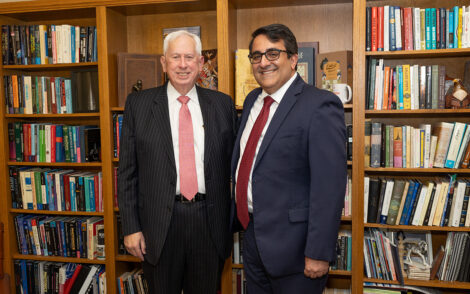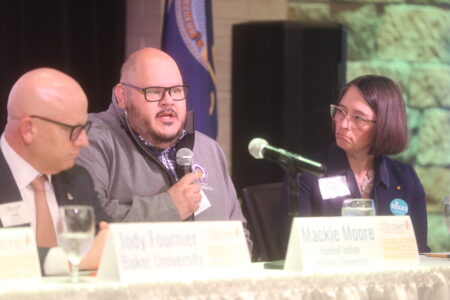James Gunn, the ‘Dad of Science Fiction,’ dies at age 97

photo by: Nick Krug/Journal-World File Photo
Pictured in this Journal-World file photo from May 2018 is James Gunn, University of Kansas professor emeritus of English, nicknamed the "Dad of Science Fiction." Gunn died Dec. 23, 2020, at age 97.
People around the world were familiar with author and professor James Gunn, who had earned the nickname of the “Dad of Science Fiction.”
But by age 97, he had also become the “granddad and the great granddad” of the genre, according to his colleague and close friend.
“A lot of people who are writers now took classes from somebody who took classes from somebody who took classes from him,” Kij Johnson explained.
Gunn, a professor emeritus at the University of Kansas English department and the founding director of what would come to be known as the Gunn Center for the Study of Science Fiction, died Wednesday morning after going to the hospital a few nights before and being diagnosed with congestive heart failure, according to an obituary on the center’s website.
When Gunn began teaching one of the first university-level science fiction classes in 1969, he was struggling to find textbooks, Johnson said — so he wrote his own. “Alternate Worlds: The Illustrated History of Science Fiction” was first published in 1975; “The Road to Science Fiction” eventually grew to six volumes, the first of which was published in 1977.
“It was originally four volumes that covered short fiction that was the history and origins of science fiction, and he wrote these just fantastically smart, short paragraphs that contextualized every single one of those stories,” said Johnson, who is the associate director of the Gunn Center and an associate professor of English at KU. “And because there were no other books like that at the time, they were used everywhere that was teaching science fiction.”

photo by: Charlie Riedel/AP File Photo
In this AP file photo from June 7, 2005, James Gunn, director of KU’s Center for the Study of Science Fiction director, holds one of his own works as he stands among a small portion of the center’s holdings on the University of Kansas campus.
Gunn brushed shoulders with other greats in the Science Fiction Hall of Fame, and among many other awards, he earned the title of Damon Knight Memorial Grand Master from the Science Fiction and Fantasy Writers of America in 2007 for his lifetime achievements in science fiction writing.
Much of that recognition came late in Gunn’s life, Johnson said. But he wrote until the end, and just a few weeks ago, he wrote an essay on that very topic.
“He said, ‘You know, the secret is to live long enough,'” Johnson said. “‘The longer you live, the more likely you are to get some of those (awards).’ And he was quite dry about that.”
And live a long time, he did. Johnson said they would often talk about life; Gunn, born in 1923, had grown up during the Great Depression and World War II, in “a world that’s radically different” from ours, Johnson said.
“And he was fearless about our world, which I thought was pretty cool too,” she said.
Not everybody got to know Gunn beyond his work — Johnson described him as a quiet, cerebral introvert “who nevertheless really, really liked people” — but he met many people at conventions, and he taught thousands of people over decades at KU.
During weekly Saturday morning breakfasts at Hy-Vee before the pandemic hit, people would come up to Gunn and say, “You won’t remember me, but I took your class in 1978,” — but sometimes, he would remember them, Johnson said.
“He had the best memory I’ve ever seen,” she said. Gunn could remember every story and every time it was published, and he could identify stories and who wrote them given just a few details; then he’d tell you all about the story, Johnson said.
But not too many of those people knew that Gunn was a proud champion in bridge. He talked about bridge a lot, Johnson said, and he took pride in winning the first tournament he ever entered in the North American Bridge Championships.
And not everybody got to meet Annie, the 12-year-old tortoiseshell cat who became a literal writer’s block when she would persistently lie on Gunn’s keyboard as he tried to work. Gunn “always wanted to make sure Annie was taken care of when he was gone,” Johnson said, and she will be — she’s going to live with another active member of the local science fiction community.
Johnson said she spent a lot of time with Gunn, especially in recent months. It was kind of a continuation of the Saturday breakfasts, she said.
“It was so easy to be there for him,” she said. “It was always a pleasure to see him. … He was so fun to talk to and his stories were always great, and I didn’t grudge it.”
Gunn’s wife, Jane, died in 2012. He’s survived by a son, Kevin, and “by so many of us, for whom he served as mentor and friend,” according to his obituary.
Gunn wrote more than 100 short stories, authored 28 books and edited another 18, according to his biography on the center’s website.
Some of Gunn’s most well-known works include “Star Bridge,” written with Jack Williamson and published in 1955; “The Joy Makers,” 1961; and “The Immortals,” first published in 1962 and adapted for a movie in 1969 and TV series in 1970. More recently, in 2017, Gunn published “Transformation,” the last novel in a trilogy, following “Transcendental” (2013) and “Transgalactic” (2016). His memoir, “Star-Begotten: A Life Lived in Science Fiction,” was also published in 2017.
Johnson said there won’t be a graveside service, but she thought there would be a memorial service at some point in the future. If anyone would like to make a donation in Gunn’s memory, he was very passionate about the Humane Society, she said.

photo by: Journal-World File Photo
In this Journal-World file photo from June 11, 2014, James Gunn, University of Kansas professor emeritus of English nicknamed the “Dad of Science Fiction,” is pictured in his Lawrence home. Gunn died Dec. 23, 2020, at age 97.
Contact Mackenzie Clark
Have a story idea, news or information to share? Contact public safety reporter Mackenzie Clark:
Related coverage
• June 23, 2017: KU master of sci-fi James Gunn, 93, publishes final book in trilogy
• Oct. 18, 2015: Lawhorn’s Lawrence: Spaceship stories and Lawrence’s future
• Aug. 14, 2015: KU’s Gunn inducted into National Science Fiction Hall of Fame
• April 11, 2008: Top Gunn: Renowned science fiction author finds fresh ways to cultivate genre
• May 10, 2006: Author still waiting for Hollywood to put his novel on big screen







